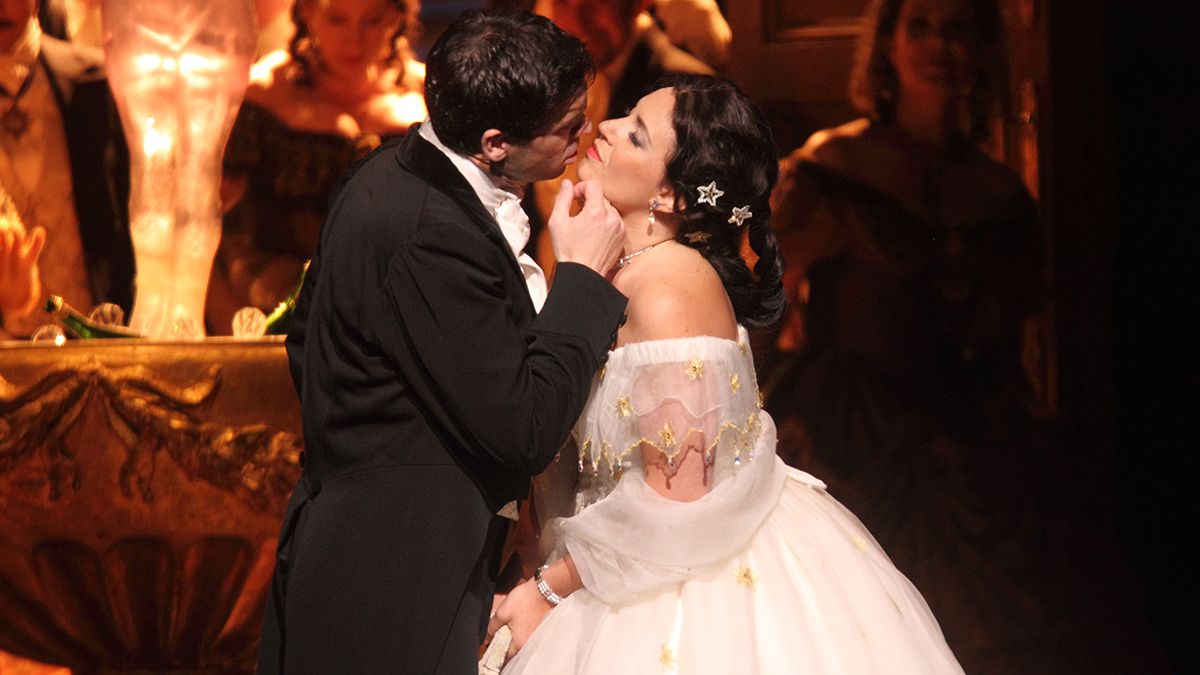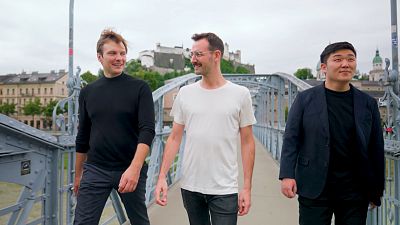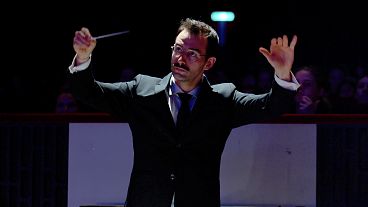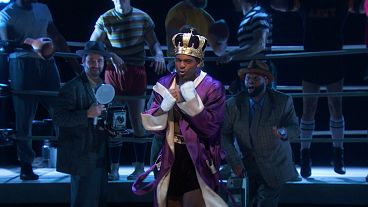“Center stage: Operalia at the Royal Opera House” was produced by the T Brand Studio international department and did not involve the International New York Times reporting or editorial departments. It was sponsored by Rolex. Text by NICK HAMMOND.
Looking to the future: How do opera houses, festivals and orchestras maintain tradition while moving their art forms forward, build and educate new audiences, and take advantage of technical innovations in communications and stagecraft?
Leaders’ vision
A rich past informs a bright future
For a major opera house in the modern world, looking toward the future can sometimes seem daunting, but the leaders of London’s Royal Opera House seem not only unfazed but positively enthusiastic about what lies ahead. Alongside Antonio Pappano, who has overseen musical direction since 2002, Kasper Holten, director of opera, and Alex Beard, chief executive, have a clear vision of how to preserve the house’s rich tradition, and transform and adapt it for the future.
Both Beard and Holten have early memories of the ROH. Beard, who was deputy director of the Tate Gallery in London before joining the house in 2013, remembers being taken aged 11 by his mother, who cashed in her single ticket for two standing places, to see Götz Friedrich’s production of Wagner’s ‘‘Die Walküre.’’ Recalls Beard: ‘‘I won’t pretend that I had a refined critical response to the opera at that age, but I did think that it was an extraordinary institution, with all the forces at work bringing to life such music and drama.’’
For his part, Holten remembers, as a teenager, obsessively watching a VHS recording of Plácido Domingo and Katia Ricciarelli performing in Puccini’s ‘‘La Bohème.’’ It was only once he was established in his post at the ROH that he saw the restaging of John Copley’s 1974 production of the opera (a staging performed for the final time in June and July 2015, to be replaced in 2017 by a new Richard Jones production) and recognized what he calls ‘‘the ‘Bohème’ of my childhood.’’ Such early memories are important, because for Beard and Holten, an appreciation of the ROH’s great past is an essential component of moving the institution forward.
On the artistic front, the ROH has many new ventures planned. Holten sums up his vision for it to continue as the leading and most exciting opera house in the world through what he calls its ‘‘breadth of offerings, depth of quality and mix of repertoire.’’ He emphasizes that Covent Garden is the only leading opera house to have its own experimental studio, together with cinema transmissions, digital streaming, backstage streaming, and educational and outreach programs, combined with maintaining the top quality of the main stage, which attracts the greatest artists in the world.
For example, in the near future, Juan Diego Flórez (Orphée), Joyce DiDonato (Charlotte in ‘‘Werther’’), Bryn Terfel (Boris Godunov) and Jonas Kaufmann (Otello) will sing major debut roles at the ROH. As for repertoire, eight new main-stage operas have been commissioned by the ROH for the next five years, an unprecedented initiative in a major opera house. These include new works by Georg Friedrich Haas, Unsuk Chin (‘‘Alice Through the Looking Glass,’’ a sequel to her previous opera, ‘‘Alice in Wonderland’’), Thomas Adès (‘‘The Exterminating Angel,’’ based on the Buñuel movie) and George Benjamin (whose ‘‘Written on Skin’’ proved such a sensational hit across the world).
All these commissions represent a huge creative and financial investment. But Holten views them as risks well worth taking in order to preserve a positive tension between new work and the standard repertoire, which will continue to be an integral part of programming. Holten points out that there are four commissioned operas for the year 2020, each of which will reflect the current state of the world and not rely on ancient myth or past stories.
In the nearer future, the ROH will participate during September and October in the London #Hofest, celebrating the work of the Israeli dancer and choreographer Hofesh Shechter and his company, with a production co-directed by Shechter and John Fulljames, the Royal Opera House’s deputy director of opera, of Gluck’s ‘‘Orphée et Eurydice,’’ conducted by Sir John Eliot Gardiner and starring Juan Diego Flórez. Following the success of September 2014, when the entire auditorium was opened to students and 16-to-25-year-olds only for a performance of Mark-Anthony Turnage’s opera ‘‘Anna Nicole,’’ the orchestra pit will be raised and opened up as standing room for students (who will pay only £10, or $16, each) during the entire run of ‘‘Orphée et Eurydice.’’ Holten himself, who directed a sold-out run of Szymanowski’s opera ‘‘Król Roger’’ in May and June, will direct Wagner’s ‘‘Die Meistersinger von Nürnberg’’ in 2017.
For the first time since the major building works of the 1990s, when the main auditorium was refurbished and the Floral Hall created, another important set of building projects (called Open Up) will start at the end of this year. In addition to the complete refurbishment of the Linbury Studio Theater, the facade of the Opera House will be opened up to an internal piazza, and the buildings made much more visible to the main part of Covent Garden, thereby enabling greater communication with the millions of visitors who come every year. The future looks exciting indeed for the ROH.

Kasper Holten, the Royal Opera House’s director of opera.
Credit: Sim Canetty-Clarke
Rendezvous: Operalia
Tomorrow’s stars at Covent Garden
For the first time, the 2015 Operalia international singing competition, founded by Plácido Domingo, is being held in London, July 13-19, at the Royal Opera House in Covent Garden. The first competition took place in Paris in 1993, where Operalia was initially based. It subsequently moved to New York, and has been held in such far-flung locations as Mexico City, Madrid, Tokyo, Hamburg, San Juan, Los Angeles, Quebec, Budapest, Milan, Moscow, Beijing and Verona.
The long list of stars who have won prizes at Operalia testifies to its success in finding and nurturing great talent. To name just a few former winners, the great Wagnerian soprano from Sweden, Nina Stemme, was an early laureate, as was the world-famous American mezzo-soprano Joyce DiDonato. The tenor José Cura, the South African soprano Pretty Yende and a soprano from Bulgaria, Sonya Yoncheva, are other winners who have since made waves in the operatic world.
Forty singers were selected for the quarterfinals of this year’s event in London: 21 women and 19 men. With three singers attached to the Royal Opera’s Jette Parker Young Artists Program and one British singer having come through to the quarterfinals, there is considerable local interest this year. Of the other quarterfinalists, nine singers are from the United States; six from South Korea, which is forging a formidable reputation for producing impressive talent; three from France and Russia; and two from South Africa and Australia. New Zealand, Japan, China, Italy, Belgium, Canada, Norway, Poland, Romania, Ukraine, Ireland, Thailand and Bulgaria are represented as well. As Alvaro Domingo, vice president of Operalia and Plácido’s son, puts it: ‘‘We have the best of the best singers competing with each other’s countries, and when they get to the quarterfinals they see the strength of the competition and that the standard is incredibly high.’’
One of the main features distinguishing Operalia from other singing competitions is the sheer range of prizes, amounting to $200,000 every year. Alvaro Domingo explains, ‘‘It was my father’s feeling that every single tessitura and repertoire is important, and so different prizes were added to recognize this diversity and to distinguish between male and female voices.’’
This year, there will be first, second and third prizes for both male and female singers, two Birgit Nilsson prizes (one male, one female) for repertoire in Wagner and Richard Strauss, two prizes for the Spanish lyric-dramatic genre zarzuela (created in honor of Plácido Domingo’s parents) and the CulturArte prize. Two prizes (one for each gender) are voted for by the audience on the final night, with each winner receiving a Rolex watch, reflecting the presenting sponsor of the event, and Plácido Domingo himself, who has been a Rolex Testimonee for more than 30 years.
As Alvaro Domingo explains, ‘‘This audience prize is decided by members of the audience, who might be less interested in the singers’ technique but who judge the whole performance of the singer and who are moved by the charm of a particular singer.’’ It is far from being a consolation prize for a performer who has not won a prize; often the judges and audience concur in their view of the most memorable and striking singer. Another aspect that makes Operalia significant is the help that the competition organizers give not only to the winners of the competition but to all finalists, assisting in launching their careers not only with financial help, but also with finalizing contracts, helping them to enroll in young artists’ programs and perfecting their vocal technique and knowledge of repertoire.
Plácido Domingo himself will be conducting the orchestra in the final on July 19. Although he is not a voting member of the 14-person jury, he acts as mediator and is able to comment on the singers he has heard at such close quarters. Alvaro Domingo is eloquent in the enthusiasm that his whole family (his mother, Marta Domingo, is a jury member) feels for the competition: ‘‘My father is incredibly proud of what he created almost 23 years ago, and he is excited to bring the competition to London, and the Royal Opera House, for the first time in its history.’’
Given that previous winners of Operalia have appeared in major international opera houses within four months of the competition, audiences around the world can look forward soon to seeing and hearing some remarkable new talent from this year’s competition.

Operalia, founded by Plácido Domingo, was held at the Royal Opera House July 13-19.
Credit: Greg Gorman / L.A. Opera
The art of the musician
Young singers step into the spotlight
The Royal Opera House is famous for the top singing stars it attracts from around the world. But since 2001, it has also had a fully integrated program to help train the Domingos, Kaufmanns and Te Kanawas of the future. Sponsored by the British philanthropists Alan and Jette Parker, the Jette Parker Young Artists Program is designed to support the artistic development of talented singers who are just embarking upon their careers.
In addition to places being available for répétiteurs, conductors and stage directors, five new singers are hired each year. They remain as salaried members of the Royal Opera House for two years, receiving constant guidance on how to survive and thrive in the operatic world, such as learning specific roles, taking group stagecraft classes and having language coaching.
David Gowland, who has directed the program since its inception, explains: ‘‘The program started off as an almost homespun enterprise, but has now expanded to become truly international. All the singers in the program are treated with respect, like colleagues, and are encouraged and nurtured by the established staff at the opera house.’’
The singers go through a rigorous selection process and need to have a secure vocal technique before they arrive, a point stressed by Gowland, who had long experience in European companies such as those of Geneva and Glyndebourne before joining the ROH. ‘‘They have to come with a level of guarantee to be able to hold their own with the main stars onstage,’’ he says, ‘‘and to be able to perform in front of Tony Pappano and Kasper Holten.’’ Antonio Pappano is the music director of the Royal Opera and Kasper Holten is director of opera.
The singers tend to perform four smaller roles per season, but they also provide cover for the major roles, which might form part of their core repertoire in the future.
This last season at the ROH, two Australian sopranos in the program, Kiandra Howarth and Lauren Fagan, received ‘‘the big break that everybody dreams of,’’ as Gowland puts it, by performing principal parts on the main stage. Howarth found herself singing the role of Adina in Donizetti’s ‘‘L’Elisir d’Amore’’ opposite Vittorio Grigolo and Bryn Terfel, and Fagan sang in two performances as Oscar in Verdi’s ‘‘Un Ballo in Maschera’’ with Joseph Calleja and Dmitri Hvorostovsky.
Both singers, along with the Irish mezzo-soprano Rachel Kelly, have been selected for the celebrated Operalia singing competition, founded by Plácido Domingo, taking place for the first time in London at Covent Garden in July. Other singers in the program have also been selected to perform in the Queen Sonja International Singing Competition, to be held in Oslo in August, and final round of the Neue Stimmen competition, taking place in October in Gütersloh, Germany.
The success of the Young Artists Program can be measured by some of the previous participants, such as the soprano Sally Matthews, who starred in a production of Poulenc’s ‘‘Dialogues des Carmélites,’’ conducted by Simon Rattle at Covent Garden in 2014; the mezzo Ekatarina Gubanova; the tenor Alfie Boe (who has hit stardom with a crossover singing career); and the bass Matthew Rose.
Matthews says she owes a great deal of her success to the Young Artists Program, and still values perhaps above all the contacts at the ROH, whom she can consult if she needs advice.
David Gowland sees the ability to rely on others’ experience and knowledge as essential to the program. Established past and present opera singers, such as Yvonne Kenny, Nelly Miricioiu and Gerald Finley, are very generous with their time in mentoring the young artists. Gowland adds that these established performers give advice on things like ‘‘stagecraft, interpretation, career guidance and even dealing with knocks that they might meet along the way.’’
It is not only singers who give their time. The Israeli conductor Dan Ettinger, who was at the Royal Opera House to conduct the final performances of the much-venerated John Copley production of Puccini’s ‘‘La Bohème,’’ has been working closely with all the aspiring singers. Also, the stage director Elijah Moshinsky gave a series of talks on the history and reception of Italian opera, which managed to change many of the singers’ assumptions. Even sword-fighting forms part of both male and female singers’ training, as such skills can be useful in future stage roles and are taught to a very high standard at the ROH. Says Gowland: ‘‘It is very exciting for these young artists to be in such a creative environment and to have the opportunity to be an integral part of the opera house.’’
Audiences can look forward to seeing and hearing some of these young singers in major opera houses thanks to the strong foundation given their careers by the Jette Parker Young Artists Program.

David Gowland, director of the Jette Parker Young Artists Program.
Credit: Michele Turriani
Behind the scenes
Setting the stage for musical magic
When enjoying the thrill of the human voice and the splendor of productions on the Royal Opera House stage, it is easy to forget the enormous preparation in design and construction that goes on behind the scenes.
September will see the opening of the Royal Opera House’s brand-new Bob and Tamar Manoukian Costume Center in its Thurrock production park. More than 20,000 costumes for operas in the current repertory of productions at the ROH, some of which have previously had to be kept as far away as Wales, will be stored on site.
Additionally, more than 6,000 historic costumes, props, furniture and musical instruments belonging to the house’s archival collections will be kept there.
The founding of the center ties in with the new B.A. honors degree in costume construction being offered by South Essex College that will be based on the same site and will begin in the fall. As Fiona Fullerton, head of costumes at the ROH, says: ‘‘It is an immensely exciting time for us and a real pleasure to have this chance to communicate our skills to new generations.’’
The eco-friendly, 14-acre (6 hectare) Bob and Tamar Manoukian Production Workshop at Thurrock, which opened in December 2010, is also home to the ROH’s set-creation team of artists, carpenters, drafters and metalworkers. Since the opening, the sets and scenery for more than 100 productions have been built there.
The Backstage Center on the same site is leading the way with its highly successful training center for creative and cultural skills. The ROH has already provided more than 13,000 hours of work experience there. Seven apprentices work on site: two in scenic carpentry, two in scenic metalwork, two in scenic painting and one in learning and participation.
Thurrock remains a major educational center, with a learning and community-engagement program for the local and wider communities, and several school projects. Twenty-one schools have already taken part in the Thurrock Trailblazer program, started in 2014.
As Alex Beard, chief executive of the Royal Opera House, emphasizes: ‘‘We want to inspire kids to use opera, ballet and the arts as part of their school curriculum.’’
In addition to the many thousands of viewers who have seen ROH productions through cinema transmissions and online streaming, the more than 60,000 people who have participated in various activities organized in Thurrock since 2007 can testify to the vibrancy of the center and its potential to extend interest in music far beyond the confines of the theater in Covent Garden.

Sonya Yoncheva — pictured here as Violetta in ‘‘La Traviata’’ with Ismael Jordi as Alfredo in the Royal Opera’s 2015 production — was an Operalia winner in 2010 and first sang at the Royal Opera in the 2012 Operalia winners concert. The Bulgarian soprano takes on the role of Micaëla in ‘‘Carmen’’ at Covent Garden in November.
Credit: Catherine Ashmore / Royal Opera House
Next generation
Transmitting the costumer’s artistry
In a world where fewer and fewer experts in their craft have the opportunity to pass on their skills to the next generation, the Royal Opera House is mindful of the need to instruct not only the singers of the future, but also those who work behind the scenes. Beginning in the fall, in conjunction with South Essex College, a three-year Bachelor of Arts program in costume construction (ratified by the University of the Arts, London) will begin at the ROH’s production park in Thurrock, some 25 miles, or 40 kilometers, from Covent Garden. A team of experts from the costume, tailoring, dye, pattern and revival sections at the Royal Opera House, in addition to experienced tutors and leading figures in the field, have combined their knowledge and skills to create the course.
Fay Fullerton, head of costumes at the Royal Opera House, who has worked at every level of costume production at the opera house since she was recruited as a student at the London School of Fashion in 1977, says: ‘‘One of the most exciting things for me as an individual is to pass on absolutely everything I know to the next generation.’’ Although it is hoped that some of the students will be able to continue to work within the opera world after graduation, they will be taught transferrable skills that will be applicable to all aspects of costume construction, which should help address some of the current shortage of skilled costumiers across the opera, theater, movie and fashion industries.
Thanks to the wealth of historical costumes now being stored on site and in an exhibition space, students will learn about the history of costume construction and design as well as picking up skills in preservation and restoration of historical costumes for archives or exhibitions. The course offers places to 18 students a year, allowing individual supervision and tuition. Rather like the singers in the Jette Parker Young Artists Program, who have the chance to sing minor roles onstage and cover the major roles, students will be given the opportunity to create costumes for actual Royal Opera House productions as part of their curriculum.

Fay Fullerton, head of costumes at the ROH.
Credit: Nicole Christopher
Rolex Culture Partners: Royal Opera House
Euronews’ ‘‘Musica’’ series goes behind the scenes of some of the most outstanding opera and classical music performances in the world. Go to tinyurl.com/Euronews-Yende to watch an exclusive interview with the South African soprano Pretty Yende, in which she reminisces about winning the Operalia competition of 2011.
Medici.tv offers live webcasts and a large catalog of classical music videos. Tune in to medici.tv/#!/operalia-competition on July 19 to watch the Medici broadcast of the final round of Operalia at the Royal Opera House. The page also includes links to videos from the final rounds of Operalia competitions from 2010-14.
A rich guide to the world of opera, Opera Online profiles young singers as well as the stars. Go to tinyurl.com/OO-Operalia to find the page dedicated to Operalia, which includes links to articles about the competition, videos of the first edition and profiles of this year finalists. A profile on the Royal Opera is at tinyurl.com/ROHhistory.



